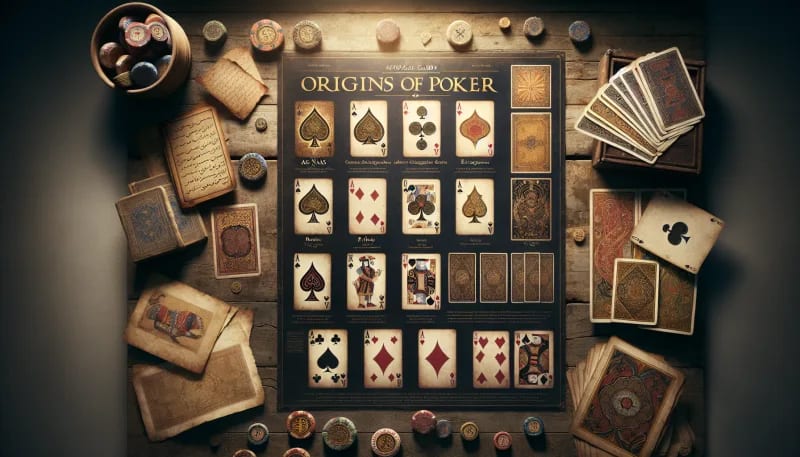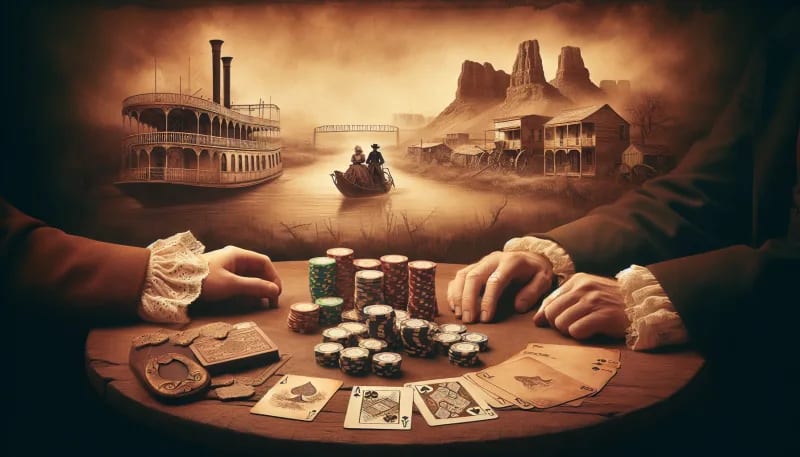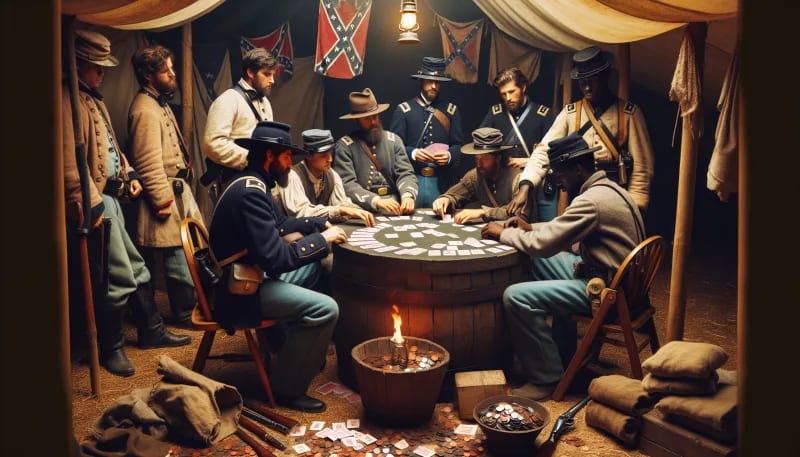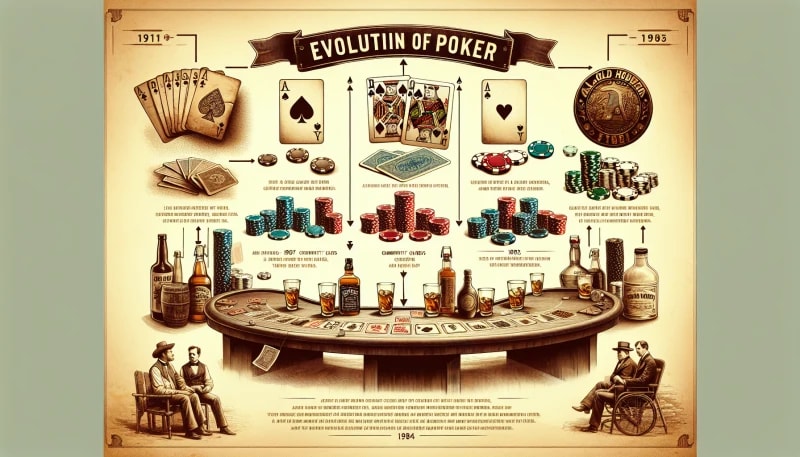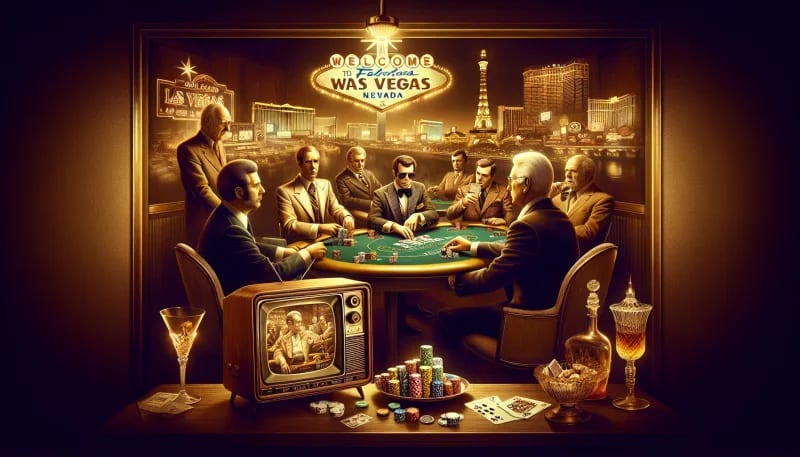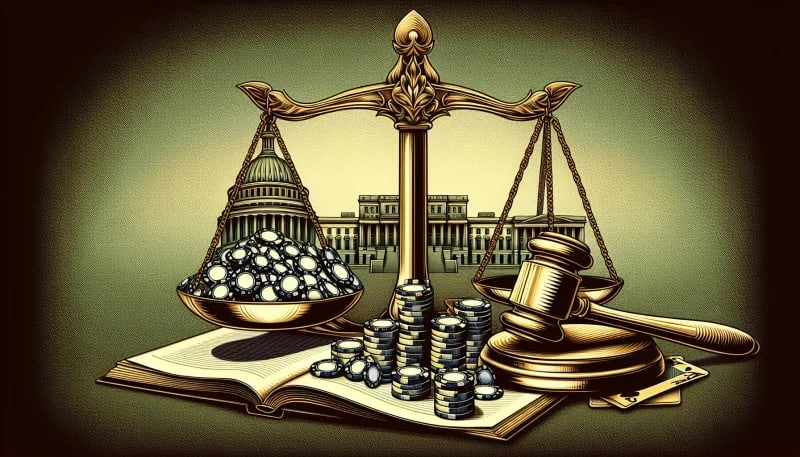Poker History Decoded: How the Civil War Shaped Modern Poker
Origins of Poker
This is the first part, where I dive into the intriguing web that traces the lineage of poker. Have you ever wondered where poker actually came from? I sure have, and let me tell you, it's a fascinating journey.
Poker's ancestry is somewhat of a murky tale, stitched together by historians with fragments of games from far and wide. Let's start with the Persian card game of As-Nas. Considered by some as a precursor to modern poker, it featured hand rankings and betting rounds, though with a simpler deck configuration. Here's a bit more on As-Nas if your curiosity's been piqued.
Then there's the European influence. A game called Primero, originating from the 16th century, laid groundwork that poker players would find familiar: bluffing and betting high stakes on poor cards. Fast forward a bit, and you'd stumble upon Poque, which has a more discernible link to poker. Originating in France, Poque was played with colors and values that we see in a modern deck.
Are these games the direct ancestors of poker, or mere distant relatives, each contributing a branch to the poker family tree? That's the debate among game historians. The connections may not be airtight, but influence is undeniable. The spirit of these games — the art of the bluff, the thrill of the bet — lives on in the heart of poker.
Imagine shuffling through the annals of history, a deck of cards your only guide. In every nation's pastime, there's a trace of poker's lineage. It's as if the game was always a nomad, picking up pieces of its identity from every card table across continents.
Now that we've scratched the surface of poker's well-traveled past, we're ready to follow the game on its next major journey. Poker Comes to America—and with it, the dawn of a cultural phenomenon. Stay tuned as I reveal how poker crossed oceans and became the favorite pastime in saloons and homes across the new world.
Poker Comes to America
So, we've already dug into the mysterious origins of poker, but how did this enigmatic game make its way to America? Let's rewind to the early 18th century. Imagine French settlers mingling in New Orleans; among them, keen card enthusiasts who brought with them poque, a close relative of poker. The bustling port of New Orleans, with its melting pot of cultures, was ripe for a new pastime.
Now, think about the colossal Mississippi River, a sprawling water highway. It wasn't long before poker began its journey, riding along in the pockets of adventurous souls. Steamboats, the tech marvels of their time, became a breeding ground for poker games. Saloons on these floating casinos echoed with the sounds of shuffling cards and clinking chips. Doesn't it sound like a scene straight out of a movie?
As poker's popularity surged, it flowed upriver, reaching cities and towns along the Mississippi. The game found fertile ground, especially in the American frontier. Here's an interesting one for you: Did you ever wonder how poker became the Wild West's favorite pastime? Think gun-slinging outlaws, gold prospectors, and frontier towns—places where a quick draw and a good poker face were invaluable.
In saloons across dusty towns, poker tables were hot with action. The game wasn't just about luck; it was a measure of a man's resolve, a test of his ability to bluff through a tight situation. The allure of poker was magnetic, cultivating a legacy that thrived among legends like Wild Bill Hickok and Doc Holliday.
By the time the Civil War broke out, poker had already cemented itself in the fabric of American culture. Soldiers from both the North and South played the game, even as they marched into uncertainty. But how did wartime struggles shape this game we've come to love? Let's shuffle up and deal into that in the next part...
Poker During the Civil War... Stay tuned.
Poker During the Civil War
As we saw in 'Poker Comes to America', the game had already entrenched itself in the fabric of early American life. But did you know that it was during the Civil War that poker really took off? Soldiers from both the Union and the Confederate armies played poker to kill time between skirmishes. Imagine that—Yankees and Rebels, unwinding with a deck of cards.
Poker camps sprung up, and with them, the stakes grew higher. Ever wonder where poker's infamous bluffing came from? You can thank those soldiers, always strategizing, always keeping a poker face not only on the battlefield but at the card table, too. They were sly, concocting elaborate bluffs to outdo their brothers-in-arms.
With soldiers from different regions thrown together, new variations of the game began to emerge. Have you ever played Stud Poker? It's said that it was during this era that such variations started to gain popularity. Check out this link for a deeper dive into Civil War culture and how poker played a part.
Rules, of course, varied from camp to camp at first. But as these men traveled, they spread the game, and a certain consistency began to form. By necessity, the standardization of rules became pivotal for the game's playability. When soldiers returned home, they took their love of the game with them, weaving poker deeper into the American social tapestry.
Just think, without this historical period, would poker be as we know it today? Unlikely.
As we move on to 'The Rise of Poker Variants,' keep in mind how the chaos of the Civil War inadvertently contributed to poker's complexity and charm. The game's evolution was much like the war itself—a mix of strategy, chance, and adaptation.
The Rise of Poker Variants
As we saw earlier, poker during the Civil War evolved significantly, but that was just the beginning. Have you ever wondered where the plethora of poker games we love today came from? Let's delve into that.
The simplest precursor to modern poker was straight poker. It used a complete hand dealt to each player and wagering rounds with little room for strategy. Boring, right? Fortunately, innovation wasn't on hold.
Enter Stud Poker. This variant, believed to have originated during the American Revolutionary War, added a whole new layer to the game. Cards were dealt in a prearranged combination of face-down and face-up rounds, or 'streets', with a round of betting following each. This changed the game by increasing the importance of strategy – players could now see some of their opponents' cards, leading to informed bets and bluffs.
It didn't stop there. Texas Hold'em burst onto the scene in the early 1900s in Robstown, Texas. It quickly upended the poker world. But why did it become the titan of poker variants?
Imagine this: each player has two private cards and up to five community cards to form their hand. The potential for strategy skyrocketed. The game was more thrilling and spectator-friendly. It was easier to track and more relatable for an audience, which played a critical role in its televised success. Texas Hold'em became the game to play, earning the crown as the most popular poker game by the 1970s.
These poker variants didn't just add rules; they completely reshaped the landscape of the game. They fine-tuned the perfect balance of luck, skill, and psychological warfare – elevating poker from a gambler's pastime to a game of profound complexity and excitement.
As we move next into Poker's Golden Age, just think about how these evolutions set the stage for poker to become a global phenomenon. Could we have had a modern World Series of Poker without these transformative games?
The answer, friends, is as clear as the ace in your hand.
Poker's Golden Age
Coming off the back of The Rise of Poker Variants, where the stage was set with all sorts of ways to play, the 20th century witnessed poker stepping into its glistening attire. I picture it now: the clatter of chips, the flick of cards, and the rise of legends.
Imagine the year is 1970. Picture a smoky room at Binion's Horseshoe in Vegas, where the very first World Series of Poker (WSOP) materialized. Sure, it was a far cry from today's multi-million-dollar spectacle, but didn't it all just click into gear? Benny Binion had no idea his little gathering of seven top-notch players would balloon into a revolution.
Now, the WSOP. It's not just an event; it's the cornerstone of poker's Golden Age. Back then, a handful of entrants eyed each other over green felt. Today? Thousands. Stars are born, legends solidified—names like Doyle Brunson and Stu Ungar echo through the halls of the Rio.
But what really turned poker into a household passion? Were televised tournaments. The first broadcast in 1973 set our hearts racing. Suddenly, we all fancied we could read a bluff, feel the tension, taste the victory. WSOP coverage on CBS changed the game's visibility – no limits, so to speak.
Televised poker let us peer into the minds of the pros. With cameras revealing hole cards, poker was no longer just a spectator sport; it became a tutorial, a drama, a masterclass. And who could forget the moment Chris Moneymaker – an online qualifier turned hero – won the 2003 WSOP Main Event? If you missed that, check out this link on his legendary win: Moneymaker's Cinderella Story.
Do I even need to ask if poker's Golden Age was pure gold? The stunning growth of tournaments, the flood of fans... It set the scene for our next thrilling chapter. As I pass the baton to "Technology Changes the Game," just remember: This was the era that turned pocket jacks into Jacks-or-better for the entire world.
Technology Changes the Game
As we wave goodbye to the glitz and glamour of Poker's Golden Age, we can't help but marvel at how the digital revolution reshaped the felt. Did we ever imagine shuffling chips would turn into clicking buttons from the comfort of our living rooms? The late 20th and early 21st centuries saw a seismic shift in how poker was played and perceived, all thanks to the growth of online poker.
Suddenly, anyone with an internet connection could ante up at virtual tables. No smoky backrooms or daunting casino vistas. It was just you, the cards, and a global mix of competitors. But what truly sparked the wildfire was Chris Moneymaker's historic win at the 2003 World Series of Poker. An accountant from Tennessee, Moneymaker turned an $86 satellite tournament entry into a colossal $2.5 million payday. Can you imagine the shockwaves?
His victory, televised for an audience of millions, ignited what we now term the "Moneymaker effect." Legions of hopefuls witnessed an everyman's triumph and thought, "Why not me?" Online poker rooms experienced a tsunami of traffic, transforming poker from a pastime to a worldwide phenomenon. But what goes up must come down. As we'll explore in "Legal Challenges and Triumphs," the poker boom faced its own hurdles. Dizzying highs led to regulatory scrutiny and legal mazes.
The influx of amateur players altered the competitive terrain. Pros had to adapt as tech-savvy rookies brought novel strategies and an eagerness to learn rapidly. Poker software evolved, too, featuring tools for analysis and training, fundamentally altering how players honed their craft. Books were swapped for databases; intuition gave way to calculated aggression.
Crucially, the ascent of online poker demonstrated the game's flexibility. It's not just about the cards you're dealt, but how you play them—digitally or otherwise. As we brace ourselves for the legal rollercoaster, remember: poker has always been more than a game. It's a constantly unfolding narrative, with technology as both the pen and the page turner.
Legal Challenges and Triumphs
The march of technology hasn't just reshaped how we play poker; it's triggered a seismic shift in the legal landscape. Can you believe there was a time when online poker operated in a Wild West fashion? Cards were dealt digitally without clear rules to govern them. That was until events like Black Friday.
Suddenly, on April 15, 2011, the Department of Justice froze the domains of major online poker sites. Imagine thousands of players finding their favorite playground locked. Through that swift crackdown, the U.S. government contended that these sites violated the Unlawful Internet Gambling Enforcement Act. The message was clear: the need for regulation was paramount.
But this wasn't the end; it was a call to action. The poker community rallied, advocating for clear, fair laws to regulate the game. And we've seen victories, too. States like New Jersey, Pennsylvania, and Nevada have fought for and won the right to legalize and regulate online poker. Check out how New Jersey is leading the charge.
This battle isn't confined to the U.S., though. Across the globe, from the European Union to Australia, the push-and-pull between players, regulators, and legislators continues. Why, you ask? Because poker isn't just a game; it's a beloved pastime, a source of income, and a community. It's worth fighting for.
I'd be remiss not to mention the triumphs in Europe. Countries like the UK, with its Gambling Commission, set a standard for others to follow. They offer a regulated online environment where players' rights and funds are protected.
As we pivot towards "The Future of Poker," one thing is certain: legal challenges will persist. But with every challenge comes a chance for triumph, as long as we, the poker community, keep calling the bluffs of outdated legislation. The future? It's ours to shape. Boldly, together.
The Future of Poker
Building on our exploration of poker's legal landscape, let's consider where the game is heading. The trajectory of poker is as exciting as a river card on a jam-packed board. Can you imagine the possibilities?
Advancements in technology have reshaped our poker tables. With online poker thriving, we can expect even more immersive and interactive experiences powered by virtual and augmented reality. AI poker players have already begun to outmaneuver humans in complex game scenarios. I've watched bots go from simplistic bluffers to nuanced strategists, and it's clear that they'll continue to influence how we refine our own strategies.
Emerging markets are opening doors to a surge of new players. From Asia to South America, poker's growth isn't just about numbers; it’s about cultural exchange, shaping the game into a truly global pastime. As more nations hop on the poker bandwagon, the pool of talent deepens and the game becomes even more competitive – and compelling.
As for gambling laws, they're always in flux. But let's be optimistic. The trend toward legalization and regulation could lead to a poker boom that rivals the early 2000s. A shift in global gambling laws may allow more players to legally join the action, creating a thriving, regulated environment that protects players and enhances the game's integrity.
In the not-too-distant future, could we see a World Series of Poker with players donning VR headsets, battling AI opponents, or playing in tournaments hosted in new poker havens around the world? The signs point to yes. The integration of technology, entry of new players, and evolution of gambling laws are reshaping the felt, and I, for one, am here for every flop, turn, and river.
Remember, poker isn't just a game; it's a constantly evolving narrative, and we're all part of the storyline. Where do you see yourself in poker's next chapter?

